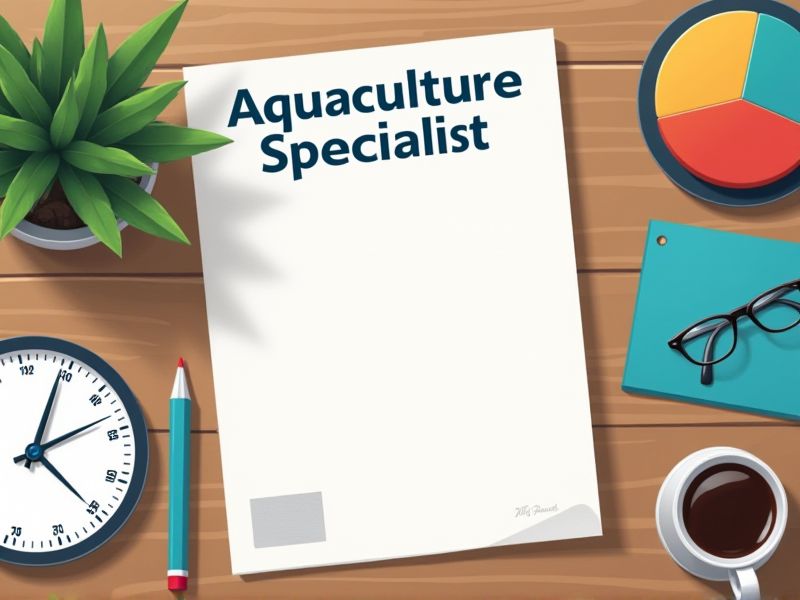
Aquaculture specialists are responsible for managing the cultivation of aquatic organisms, which demands a profound understanding of biological processes and environmental regulations. Certifications ensure that these professionals meet industry standards for sustainable practices and biosecurity measures. With the complexity of aquatic ecosystems, certified specialists are more equipped to enhance productivity and ensure compliance with legal requirements. Key certifications for an Aquaculture Specialist may include the following.
Certified Aquaculture Specialist (CAS)
Certified Aquaculture Specialists bring expertise in sustainable fish farming practices, promoting healthier fish populations and reducing environmental impact. Certification ensures they stay updated with the latest techniques and regulations, vital for compliance and innovation in the industry. CAS credentials enhance credibility, facilitating trust with stakeholders and potential investors. Trained specialists can optimize resource use, improving production efficiency and profitability for aquaculture operations.
Aquaculture Technician Certification (ATC)
Aquaculture Technician Certification (ATC) ensures that aquaculture specialists possess standardized knowledge, crucial for maintaining industry credibility. Proper certification aligns specialists with regulatory compliance, impacting environmental sustainability. Certification enhances job prospects by showcasing a competitive edge based on verified skills. It also helps in reducing operational risks by assuring adherence to best management practices.
Sustainable Aquaculture Practices Certification (SAPC)
Sustainable Aquaculture Practices Certification is needed because it ensures aquaculture specialists adhere to environmentally friendly methods, minimizing ecological impact. This certification enhances consumer confidence by verifying that seafood products are responsibly farmed. It promotes industry standards that improve fish health and welfare, reducing diseases and improving yields. SAPC drives innovation by encouraging specialists to adopt practices that reduce resource consumption and waste.
Marine Aquaculture Specialist Certification (MASC)
Marine Aquaculture Specialist Certification (MASC) enhances knowledge and skills, leading to improved practices in aquaculture operations. Certified specialists tend to have access to better job opportunities due to industry recognition of the credential, as evidenced by employment trends. Certification ensures adherence to environmental and safety standards, reducing ecological impacts and promoting sustainable practices. MASC facilitates professional networking, providing access to cutting-edge research and innovations in marine aquaculture.
Aquaculture Health Management Certification (AHMC)
Increased global demand for fish and seafood drives the need for sustainable practices, making Aquaculture Health Management Certification (AHMC) essential for aquaculture specialists. Disease outbreaks can lead to significant financial losses, necessitating trained professionals to manage and prevent such risks effectively. Certification equips specialists with up-to-date knowledge on health regulations and biosecurity measures, ensuring compliance and safety. Stakeholders and consumers often prefer certified and accountable aquaculture products, enhancing market trust and stability.
Water Quality Management Certification (WQMC)
Aquaculture specialists who hold a Water Quality Management Certification improve the health of aquatic organisms by ensuring optimal water conditions are maintained, decreasing disease prevalence. Certified specialists implement effective water treatment methods, which leads to higher production yields and more sustainable aquaculture practices. Regulatory compliance is enhanced, preventing costly legal issues and protecting the aquatic ecosystem. Stakeholder confidence increases in the quality and safety of the seafood produced, positively impacting market access and profitability.
Fish Nutrition and Feed Management Certification (FNFMC)
Aquaculture specialists require the Fish Nutrition and Feed Management Certification (FNFMC) to ensure they are applying the most efficient feed strategies, which directly impacts fish growth and health. Proper certification helps in minimizing feed waste, consequently reducing environmental impact and improving sustainability in fish farming operations. Certified specialists often demonstrate a greater understanding of nutrient requirements, elevating overall farm productivity. The certification also serves as a credible validation of a specialist's skills, leading to better job opportunities and career advancement in the aquaculture industry.
Aquaculture Biosecurity Certification (ABC)
Aquaculture Biosecurity Certification is needed because it helps prevent the introduction and spread of pathogens in aquaculture environments. This certification ensures specialists are equipped with the knowledge to implement biosecurity protocols effectively. By following certified guidelines, aquaculture specialists can reduce the risk of disease outbreaks, safeguarding both stock health and economic viability. Government and industry regulations often require certified practices to maintain sustainable and responsible aquaculture production.
Environmental Impact Assessment for Aquaculture Certification (EIAC)
The Environmental Impact Assessment for Aquaculture Certification (EIAC) provides aquaculture specialists with a framework to identify and mitigate potential ecological risks associated with their operations. Aquaculture activities can lead to water pollution, habitat destruction, and species imbalance, necessitating a thorough evaluation to minimize negative outcomes. Implementing EIAC ensures compliance with environmental regulations, reducing liability and enhancing the operation's reputation. Access to certification through EIAC can open new market opportunities by meeting consumer demand for sustainable seafood.
Seafood Safety and Quality Certification (SSQC)
Seafood Safety and Quality Certification (SSQC) ensures aquaculture specialists adhere to rigorous standards, reducing the risk of contamination in seafood products. It enhances consumer confidence, as certified products are perceived as safer and of higher quality. Compliance with SSQC guidelines can lead to improved access to international markets, fostering industry growth. The standardization provided by SSQC helps in maintaining ecosystem balance by promoting environmentally sustainable practices.
Summary
When you obtain certifications as an Aquaculture Specialist, your expertise in aquaculture practices increases, giving you greater technical know-how. Enhanced skills lead to improved fish farming techniques, resulting in higher yield and reduced environmental impact. Employers value certifications, thus boosting your job prospects and potential for higher earnings. Your credibility in the industry can foster collaborations and opportunities in research and development.
